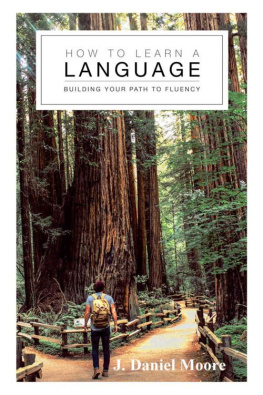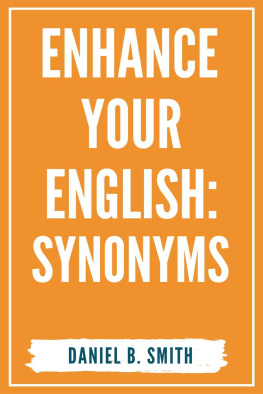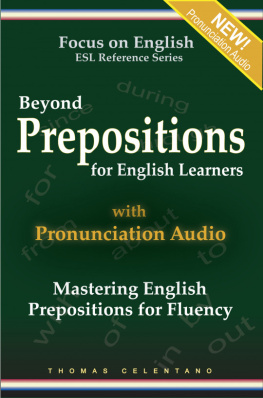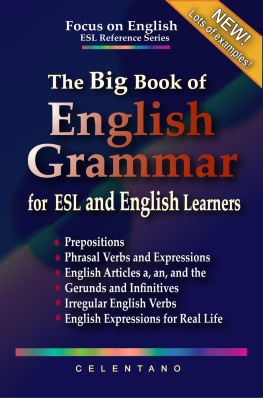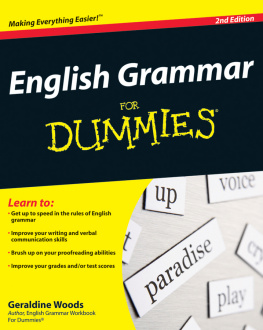J. Daniel Moore - The Logic of English Prepositions Workbook: Exercises to Help you Feel the English Language
Here you can read online J. Daniel Moore - The Logic of English Prepositions Workbook: Exercises to Help you Feel the English Language full text of the book (entire story) in english for free. Download pdf and epub, get meaning, cover and reviews about this ebook. year: 2018, genre: Business. Description of the work, (preface) as well as reviews are available. Best literature library LitArk.com created for fans of good reading and offers a wide selection of genres:
Romance novel
Science fiction
Adventure
Detective
Science
History
Home and family
Prose
Art
Politics
Computer
Non-fiction
Religion
Business
Children
Humor
Choose a favorite category and find really read worthwhile books. Enjoy immersion in the world of imagination, feel the emotions of the characters or learn something new for yourself, make an fascinating discovery.
- Book:The Logic of English Prepositions Workbook: Exercises to Help you Feel the English Language
- Author:
- Genre:
- Year:2018
- Rating:5 / 5
- Favourites:Add to favourites
- Your mark:
- 100
- 1
- 2
- 3
- 4
- 5
The Logic of English Prepositions Workbook: Exercises to Help you Feel the English Language: summary, description and annotation
We offer to read an annotation, description, summary or preface (depends on what the author of the book "The Logic of English Prepositions Workbook: Exercises to Help you Feel the English Language" wrote himself). If you haven't found the necessary information about the book — write in the comments, we will try to find it.
J. Daniel Moore: author's other books
Who wrote The Logic of English Prepositions Workbook: Exercises to Help you Feel the English Language? Find out the surname, the name of the author of the book and a list of all author's works by series.
The Logic of English Prepositions Workbook: Exercises to Help you Feel the English Language — read online for free the complete book (whole text) full work
Below is the text of the book, divided by pages. System saving the place of the last page read, allows you to conveniently read the book "The Logic of English Prepositions Workbook: Exercises to Help you Feel the English Language" online for free, without having to search again every time where you left off. Put a bookmark, and you can go to the page where you finished reading at any time.
Font size:
Interval:
Bookmark:
The Logic of English Prepositions Workbook : Exercises to Help you Feel the English Language
Copyright 2018 J. Daniel Moore
All Rights Reserved.
Original Cover Design by Chongho Lee
Contact Information:
This book is dedicated to my parents. I love you.
- Table of Contents
- Introduction
This book is designed to be used with the book: The Logic of English Prepositions: Intuitively Understand and Feel English like a Native Speaker. This book contains many different exercises that you can use in order to help you master the logic of each preposition. However, this book is only one tool and you still have to practice using the prepositions and their logic in speaking and writing. Theres a big difference between understanding something and being able to use it yourself .
Each exercise in this book has instructions and an answer section. The answers are fully explained, just like in the main book. The answer sections are directly after the exercises so that you can more easily check your answers without having to go to the back of the book. I recommend that before you do each exercise, get a piece of paper and a pen or open a blank word document so that you can write down your answers. If you check the answers and you made a mistake, try to understand why you made that mistake before reading the description. This will help you learn and remember better.
Like in the main book, I try to explain everything as clearly as possible, but because this book is based on the previous one, I assume that you already know a lot of the information. If youre using this book before finishing The Logic of English Prepositions, thats fine. That book is also a reference that you can use to find more information and check any details. You can finish that book and then use this one, or you can use this book and then search for more information in the main book when you need it. Just remember, the more time you spend thinking about the logic and practicing, the more familiar youll become with these ideas, which will start to make things clearer, but it will take a little bit of time.
NOTE: When youre learning any skill, its not about always getting the answer correct and trying to avoid every mistake. Thats what schools teach us, and its a horrible system, which is one reason why most people cant have a basic conversation after 4+ years of language classes. Relax, do your best, and if you make any mistakes, learn from them.
- Confusing Prepositions 1
Instructions : Each section uses only two prepositions. You have to choose the correct one. Sometimes, both are right, but the meaning might change.
IN vs ON
1) Youre in/on my chair.
2) Please explain the idea in/on your own words.
3) I live in/on the mountains.
4) Whats in/on your mind?
5) What did you have in/on mind?
IN vs AT
1) He dies in/at the end of the movie.
2) Its in/at the middle.
3) I measured the length of the wall in/at inches.
4) In/At the future, you should be more careful.
5) Im studying in/at that school.
TO vs AT
1) Im good to start if you are. / Im good at starting if you are.
2) He started dancing to/at the music.
3) He always looks to/at me for help.
4) The price could fall to/at $50.
5) Theres a lot to/at learning a language that the average person doesnt know.
TO vs FOR
1) Take it to/for him.
2) To/For a cellphone from the 90s, it actually works really well.
3) (A soccer match:) The score is two to/for three.
4) Ill give you $20 to do it. / Ill give you $20 for doing it.
5) (End of the American Pledge of Allegiance:) With liberty and justice to/for all.
ON vs ABOUT
1) There are a lot of interesting things to say on/about that topic.
2) Theres just something on/about this math problem that I dont understand.
3) Think on/about it and tell me your answer tomorrow.
4) (During the news:) Shes reporting on/about the new library.
5) Hes walking on/about the grass.
- Answers and Explanations
IN vs ON
1) Youre in my chair. Surprisingly, we use the preposition in here. This is something that confuses a lot of English learners. Of course, its perfectly logical to think that we should use the preposition on. Youre physically sitting on top of a surface. However, the English language looks at chairs (and other kinds of seats) as personal containers. There are times when you can use the preposition on, but the preposition in is more common. Remember, it can depend on the context and exactly what you want to say. But why do we use the preposition in? Think of an armchair (a chair that has spots on the side for your arms to rest on). Youre inside the space thats created by the chair. When we think of a place that you sit as a seat, thats a space that you occupy. This is true even if you sit on the grass. As long as you label a specific spot on the grass as a seat, it becomes a space for sitting.
2) Please explain the idea in your own words. Remember that languages are containers. We speak in English, in Spanish, etc We dont always need the preposition in, because its not always needed (for example, I speak English; see group six in the main book for more information). When we say, in your own words, it means that you heard or read something and then someone tells you to explain what you heard or read, but using your words, not the words that you heard or read. For example, you read a paragraph from a book and you have to explain what you read without saying exactly what the author said. Just like you can speak in English, you can put things in(to) your own words. Your words become the container that carry the message that youre trying to communicate.
3) I live in the mountains. When we say mountains (plural), we usually use the preposition in. The plural creates an area and you live somewhere in that area. This is because mountains is about a mountain range and not a particular mountain. However, if we use the word mountain (singular), we use the preposition on, because its like youre physically on top of the mountain. If you use the preposition in with the word mountain, it means inside the mountain, meaning under the ground or in a cave. In reality, you can say, I live in the mountains or I live on the mountain and they mean the same thing because theyre so close.
4) Whats on your mind? This is a strange one and its an idiom. Most of the time, your mind is an abstract container thats holds your thoughts. However, the phrase, Whats on your mind? means that I want to talk to you about something thats important. If its important, then it has some weight. We even have a phrase: Somethings been weighing on my mind... So in this context, whatever the important thing is that I want to talk about, its pressing downward onto my mind, which causes stress.
5) What did you have in mind? Now we can use the preposition in and not the preposition on. This one is easier. Thoughts and ideas are in your mind, which is a container in this case. When we use this phrase, it means that someone has a plan and I want them to tell me what that plan is. For example: I think I have a way that we can make a lot of money. Really? What did you have in mind?
IN vs AT
1) He dies at the end of the movie. The end of something is a specific point.
2) Its in the middle. We use the preposition in with the word middle because were talking about the space or period of time thats half-way between two points, which is like the middle of a container. The two points (beginning and end, for example) are like the sides of the container, so we usually use the preposition at because theyre specific points. The middle is also a specific point, but because its between the other two, its like its inside the area of those two point.
Next pageFont size:
Interval:
Bookmark:
Similar books «The Logic of English Prepositions Workbook: Exercises to Help you Feel the English Language»
Look at similar books to The Logic of English Prepositions Workbook: Exercises to Help you Feel the English Language. We have selected literature similar in name and meaning in the hope of providing readers with more options to find new, interesting, not yet read works.
Discussion, reviews of the book The Logic of English Prepositions Workbook: Exercises to Help you Feel the English Language and just readers' own opinions. Leave your comments, write what you think about the work, its meaning or the main characters. Specify what exactly you liked and what you didn't like, and why you think so.


